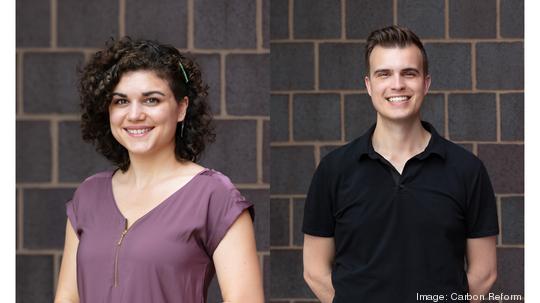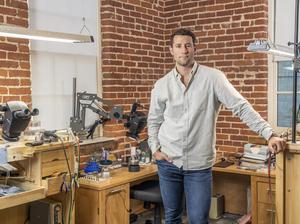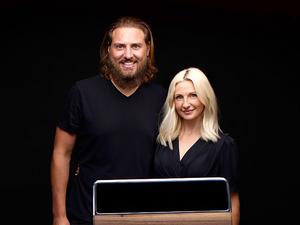
Carbon Reform, a Wilmington startup focused on improving air quality and reducing carbon emissions in buildings, has raised a $3 million seed round to commercialize its technology.
The round was led by Azolla Ventures, a climate tech VC firm, with participation from Virya LLC, Revolution's Rise of the Rest Seed Fund, Plug and Play Ventures, Gaingels, and Preston Schell.
Carbon Reform's technology can integrate onto an existing HVAC system, removing carbon dioxide from the air in a building so that it can be recirculated.
The company was founded by Jo Norris and Nick Martin, who both attended the University of Delaware. Norris earned her doctorate in materials and engineering, while Martin attended the university for an undergraduate degree in chemical engineering. The company was founded in February 2020 with what Norris described as a mission to "democratize access to carbon capture."
Carbon capture is the process of removing carbon emissions from the air and often involves transporting and storing the captured carbon deep underground. That process is usually energy intensive and hosted by a large power plant.
By creating what Norris described as an appliance-like device that can attach onto preexisting HVAC systems that heat, cool and ventilate buildings, Carbon Reform is looking to change that process. Once captured with its technology, the device then stores carbon in mineral form.
"What we want to do is bring [carbon capture technology] to the public," Norris said, adding that "by combining it with existing infrastructure, that's where we're saying we're democratizing access. We're utilizing the infrastructure of our customers. We are interested in their current pain points and actually solving a problem for them."
Because Carbon Reform's technology works to reuse air within a building, it can also lower the cost of air conditioning or heating, according to the company.
Norris said that Carbon Reform projects it can lower HVAC usage energy for some systems "up to and beyond 40%." In addition to the benefits for the climate, Norris said she thinks building owners can see a return on investment within two to five years.
The company hasn't yet disclosed a price model for its technology.
There is another financial benefit for companies as well. Carbon credits allow companies to emit a certain amount of carbon and the credits can be bought and sold. A company that uses more carbon would need to spend more money on carbon credits so reducing carbon emittance could bring in added revenue for a business.
With the seed round, Carbon Reform is readying to launch its pilot which will largely focus on one- to two-story buildings between 20,000 to 50,000 square feet, Norris said. It also expects to file a patent for the technology in the coming months.
Additionally, Norris said she is looking to at least double her current team of five over the next year and wants to expand lab and office space as well.
The goal is to commercialize the technology, which Norris said could be about 18 months after the pilots begin and following a Series A, which the team will start looking to raise around the middle of next year.
"The ultimate goal is to be in skyscrapers in New York City, but we're working up to that," she said.







